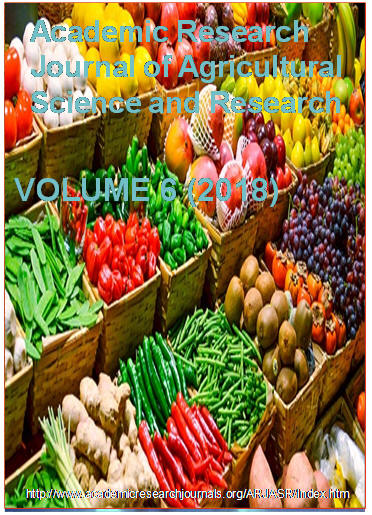| ARJASR |
Academic Research Journal of
Agricultural Science and Research |
|||||||||||||||||||
|
Vol. 6(9), pp. 584-595. December, 2018. ISSN: 2360-7874 DOI: 10.14662/ARJASRD2018.120 Full Length Research An Econometric Modelling of the Effect of Armed Conflict on Agricultural Production in Nigeria: (1961-2017)
1*Binuomote, S. O., 1Adeleke, O. A., 2Farayola, C. O., 3Olawuyi, T. O. and 1S. A. Adebayo
1Department of Agricultural Economics, Faculty of Agricultural Sciences, Ladoke Akintola University of Technology, PMB 4000, Ogbomoso, Oyo State, Nigeria. E-mail: *sobinuomote@lautech.edu.ng; +2348033879828 2Department of Agricultural Development and Management, Agricultural and Rural Management Training Institute (ARMTI), P.M.B. 1343, Ilorin, Kwara State. Nigeria. E-mail: cofarayola@armti.gov.ng 2Research Outreach Department, National Cereals Research Institute, P.M.B 8, Badeggi, Niger State, Nigeria.
Accepted 10 December 2018
This study provides evidence for the reality that sustained armed
conflict in Nigeria may have significant effect on agricultural
production and consequently food security in Nigeria in the long- run.
The effect of armed conflicts on agricultural production in Nigeria was
modeled in this research work with the use of Autoregressive Distributed
Lags (ARDL) analytical technique while employing data which span the
period of 1960-2017 and obtained from
Central Bank of Nigeria (CBN) statistical bulletin, the statistical
online database of the Food and Agricultural Organization (FAOSTAT) of
the United Nations, the
Polity IV Project of the Center for
Global Policy School of Public Policy, George Mason University and
Center for Systemic Peace. Augmented-Dickey unit root analysis of the
data show that the price of crude oil (
Keywords: Armed Conflict, Crude Oil, Agricultural Production, Food Security, Boko-Haram
How to cite this article (APA Style): Binuomote, S.O., Adeleke, O.A., Farayola, C.O., Olawuyi, T.O., Adebayo S.A. (2018). An Econometric Modelling of the Effect of Armed Conflict on Agricultural Production in Nigeria: (1961-2017). Acad. Res. J. Agri. Sci. Res. 6(9): 584-595
|
|||||||||||||||||||
